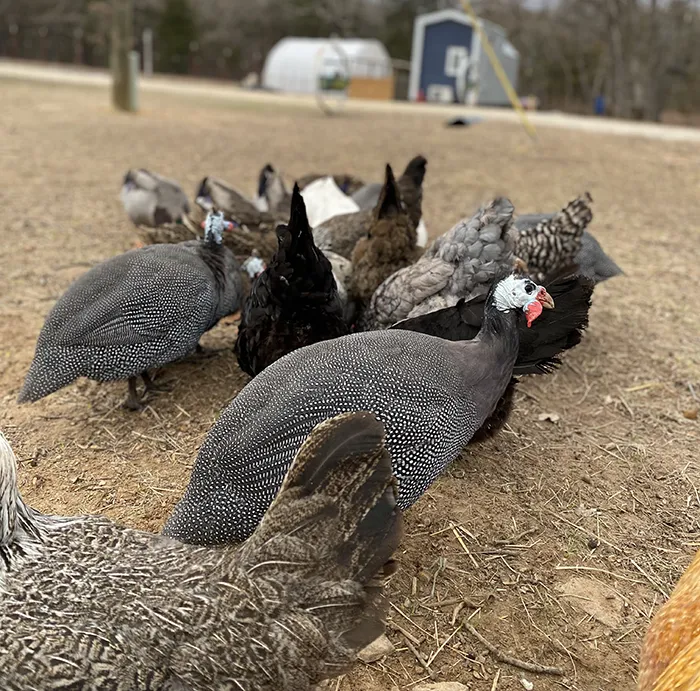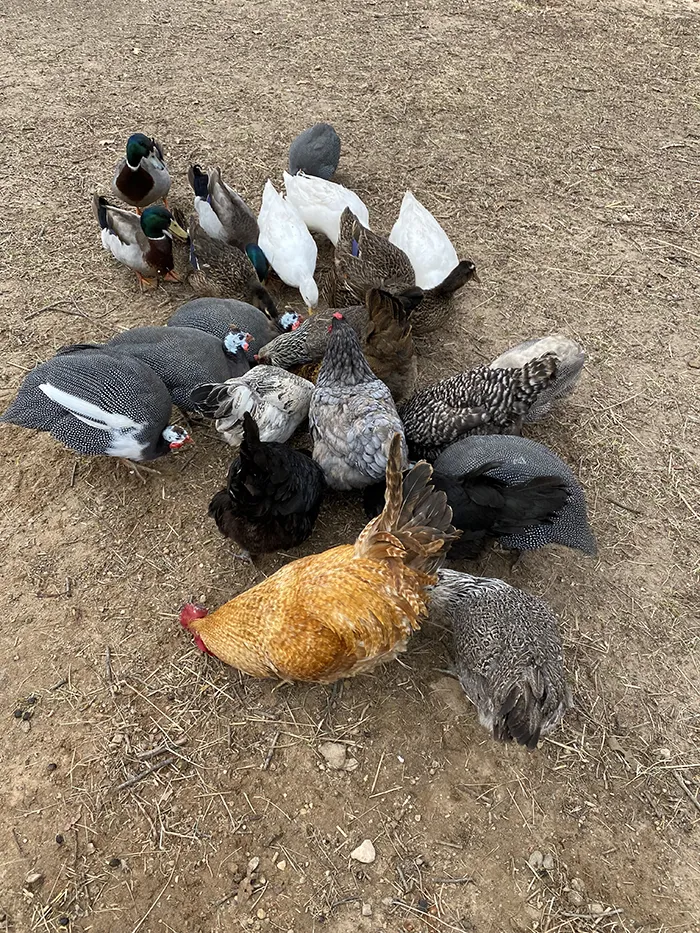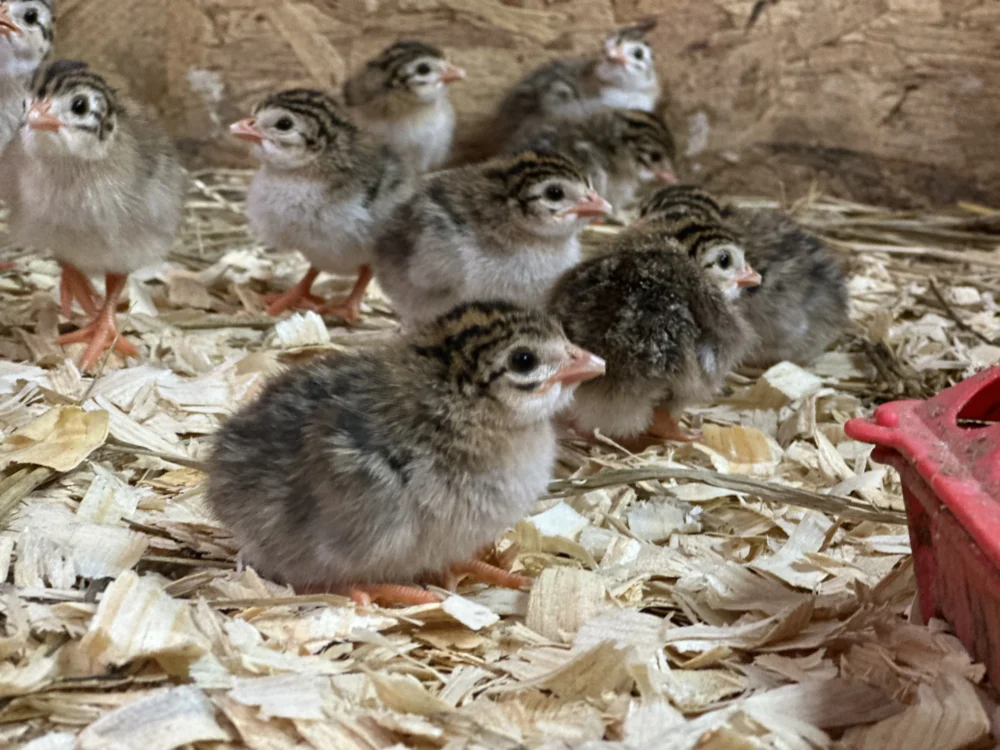Have you considered Guinea Fowl as the unsung heroes of your homestead? Originating from Africa, these unique, hardy birds have been underestimated for decades, often viewed as mere ornamental additions to rural landscapes. At Merry Meadows Farm, located in beautiful Kingston, Oklahoma (zone 7b), we’ve discovered firsthand just how valuable Guinea Fowl can be beyond their decorative appeal.
Across our 18 acres of gently rolling pastureland, where we raise over 30 goats, chickens, ducks, and maintain bee hives, Guinea Fowl have proven themselves indispensable. From pest control and security alarms to sustainable farming practices and nutritious eggs, Guinea Fowl provide practical benefits every homesteader should consider. After three years of raising these remarkable birds alongside our other livestock, we’re convinced they deserve a place on every serious homestead. Do you have chickens already and are wondering if guinea fowl will be a good fit? Check out our article Can Guinea Fowl And Chickens Live Together?
The Ultimate Pest Control Specialists
Tick and Flea Management
Guinea Fowl are nature’s own pest control specialists, and their effectiveness against ticks is nothing short of remarkable. A single Guinea Fowl can consume up to 4,000 ticks annually, significantly reducing the risk of Lyme Disease for families, pets, and livestock. On our farm, we’ve seen a dramatic reduction in tick populations since introducing our guinea fowl flock years ago.
What makes them so effective? Guinea fowl have an instinctive drive to hunt and peck at small moving objects. Their keen eyesight allows them to spot ticks in tall grass, and their methodical foraging patterns ensure they cover every inch of available ground. Unlike chickens, which tend to scratch and disturb soil, guinea fowl are more precise in their hunting approach.


Garden Pest Control
Beyond ticks, guinea fowl excel at controlling grasshoppers, beetles, flies, and other garden pests. During our Oklahoma summers, when grasshopper populations can devastate crops, our guinea fowl patrol the vegetable gardens and flower beds with military precision. We’ve observed them working in coordinated groups, methodically clearing sections of our property of unwanted insects.
However, it’s important to note that guinea fowl will also eat beneficial insects and small reptiles. We’ve learned to manage this by allowing them access to problem areas during peak pest seasons while restricting their access to areas where we want to preserve beneficial insect populations.
Rodent Deterrent
While not their primary prey, guinea fowl also help control small rodent populations. Their constant presence and noise make areas less attractive to mice and rats. We’ve noticed fewer rodent issues in our barn and feed storage areas since introducing guinea fowl to our farm routine.
Nature’s Most Effective Alarm System
Predator Detection
Guinea fowl possess an almost supernatural ability to detect predators and unusual activity. Their loud, distinctive calls – which can be heard up to half a mile away – alert us immediately to the presence of hawks, raccoons, coyotes, or any intruders on our property. This natural alarm capability has saved our chickens and goats from predation countless times.
At Merry Meadows, our guinea fowl have alerted us to everything from loose dogs, snakes and hawks. Their calls are so specific that we’ve learned to distinguish between different types of alerts – a sharp, repetitive call for aerial predators versus a more frantic, continuous alarm for ground-based threats. Of course sometimes they just seem to be talking to each other, but this sounds a bit different and we can distinguish the different sounds.
Integration with Guard Animals
Our livestock guardian dogs, Henry and Libby, have learned to respond to guinea fowl alarms. When the guineas sound their warning calls, Henry immediately investigates the area with Libby following behind. This partnership between our guard dogs and guinea fowl has created a comprehensive security system that protects our entire 18-acre property.
Managing False Alarms
Yes, guinea fowl can be noisy, and they do occasionally sound false alarms. However, we’ve found that proper management significantly reduces unnecessary noise. Well-fed, secure guinea fowl are generally quieter than stressed or hungry birds. We’ve also noticed that establishing a routine helps – our birds are most vocal during dawn and dusk transitions, which aligns naturally with peak predator activity times.
Hardy Birds Built for Homestead Life
Climate Adaptability
Guinea fowl are incredibly resilient birds, perfectly suited to Oklahoma’s diverse climate conditions. Their African origins equip them with the ability to withstand both our scorching summers (often exceeding 100°F) and our occasional winter freezes. During the brutal summer of 2023, when temperatures remained above 95°F for weeks, our guinea fowl continued their normal foraging patterns while our chickens sought shade and reduced activity.
In winter, guinea fowl grow thicker feathers and naturally adapt their behavior. They roost together for warmth and become more active during warmer midday hours. We’ve successfully maintained our flock through Oklahoma winters with minimal intervention, providing only basic windbreak shelter. Or they’ll join the goats in their barn on really cold nights.
Minimal Care Requirements
Compared to other poultry, guinea fowl require remarkably little daily care. They’re excellent foragers, finding much of their food naturally. During growing season, our guinea fowl supplement their diet with insects, seeds, and vegetation found across our pastures. We provide supplemental feed during winter months and periods of drought, but their self-sufficiency is impressive.
Their housing needs are also minimal. Guinea fowl prefer to roost in high places – trees, barn rafters, or elevated structures. We’ve provided simple roosting bars in our barn, but many of our birds choose to sleep in the old oak trees scattered across our property.
Water and Shelter Needs
Guinea fowl need access to clean water daily, like all poultry. We use automatic waterers placed strategically around our property. During Oklahoma’s hot summers, we ensure multiple water sources are available in shaded areas.
For shelter, guinea fowl need protection from severe weather and nighttime predators. Our setup includes:
- Open-sided shelter with roosting bars
- Predator-proof fencing around critical areas
- Emergency shelter during severe storms
- Multiple escape routes to prevent trapping
Gourmet Egg Production
Nutritional Benefits
Guinea fowl eggs are often considered gourmet products, prized for their exceptional nutritional value and rich flavor. These eggs are smaller than chicken eggs but pack significantly more protein, vitamins, and minerals. The yolks are particularly rich, with a deep orange color that indicates high beta-carotene content.
At Merry Meadows, we’ve incorporated guinea eggs into our farm store offerings, selling them for $6 per dozen compared to $4 for chicken eggs. The price difference reflects both their nutritional superiority and their seasonal availability.
Culinary Applications
Guinea eggs excel in baking applications due to their higher protein content and richer flavor. We’ve used them in:
- Artisan bread and pastries
- Custards and ice creams
- Pasta making
- Gourmet quiches and frittatas
Their thicker shells make them excellent for long-term storage, and we’ve successfully kept guinea eggs fresh for up to six weeks under proper refrigeration.
Seasonal Production Patterns
Guinea fowl are seasonal layers, typically producing eggs from late spring through early fall. In Oklahoma, our birds begin laying in April and continue through September, with peak production during May and June. A single hen can lay 60-100 eggs per season, making them worthwhile despite their shorter laying period compared to chickens. Although you may spend a bit more time looking for their nesting spots. They seem to pick a new nesting spot every time and you have to be on the lookout for a guinea nest.


Disease Resistance and Flock Health
Natural Immunity
One of Guinea fowl’s greatest advantages is their natural resistance to many common poultry diseases. Unlike chickens, which could require extensive vaccination programs, guinea fowl rarely suffer from Newcastle disease, fowlpox, or common respiratory infections. This natural immunity translates to lower veterinary costs and reduced medication needs.
In our three years of raising guinea fowl, we’ve had zero disease-related deaths, compared to occasional losses in our chicken flock. This resilience makes guinea fowl particularly valuable for homesteaders seeking low-maintenance livestock options.
Preventive Care
While guinea fowl are naturally healthy, basic preventive care includes:
- Regular observation for unusual behavior
- Maintaining clean water sources
- Providing adequate nutrition
- Ensuring proper ventilation in roosting areas
- Monitoring for external parasites
We recommend establishing a relationship with a veterinarian familiar with guinea fowl, as their care requirements can differ from standard poultry practices.
Environmental and Sustainability Benefits
Regenerative Agriculture
Guinea fowl contribute significantly to regenerative agriculture practices. Their constant foraging naturally aerates soil, and their droppings provide valuable fertilizer. Unlike heavy livestock that can compact soil, guinea fowl’s light weight and ground-scratching behavior actually improve soil structure.
We’ve observed improved grass growth in areas regularly grazed by our guinea fowl, and their pest control reduces our need for chemical interventions. This aligns perfectly with our sustainable farming philosophy at Merry Meadows.
Biodiversity Support
While guinea fowl do consume some beneficial insects, they primarily target pest species. Their selective foraging helps maintain ecological balance while controlling problem insects. We’ve noticed improved pollinator activity in areas where guinea fowl control aphids and other pests that damage flowering plants.
Integration with Other Livestock
Poultry Integration
Guinea fowl can successfully coexist with chickens, ducks, and other poultry, though integration requires careful management. We’ve found that raising guinea keets alongside chicks creates the strongest bonds. Adult guinea fowl may dominate chickens at feeding time, so we provide multiple feeding stations to prevent competition.
Our guinea fowl and chickens share roosting space in the barn, with guinea fowl naturally claiming higher perches. This arrangement works well and actually provides additional security for our chickens, as guinea fowl are more alert to predators.
Large Livestock Compatibility
Guinea fowl integrate exceptionally well with larger livestock. Our goats seem to enjoy the guinea fowl’s presence, and we’ve observed guinea fowl riding on goat backs and foraging around grazing goats. This symbiotic relationship benefits both species – guinea fowl find insects disturbed by grazing goats, while goats benefit from reduced fly and tick populations. And the same goes for our miniature donkeys and our horse. All of our large livestock integrate perfectly with our guinea fowl.
Getting Started With Guinea Fowl: A Practical Guide
Purchasing and Initial Setup
Start with day-old keets (baby guinea fowl) for the best integration results. We recommend purchasing at least 6-8 keets, as guinea fowl are social birds that thrive in groups. Keets cost $3-5 each from reputable hatcheries, making the initial investment relatively modest.
Although, you can start with adult guinea fowl, they are more likely to fly off and make a new home. To help the guinea fowl recognize that their new home was on our farm, we kept them in an enclosed run for about 2-3 weeks. Before letting them roam the farm, we had them in the run and then slowly transitioned. When we did let them roam, we still fed them in their run. This way they would learn to come back “home” for food.
Essential equipment for keets includes:
- Brooder setup for first 6-8 weeks
- Heat lamp and temperature control
- Appropriate feed (higher protein than chicken feed)
- Waterers and feeders
- Secure brooder space


Raising Keets
Keets require similar care to chicks but need higher protein levels (24-26% protein for first 6 weeks). We use game bird starter feed, which provides appropriate nutrition for developing guinea fowl. While chicken starter feed may work, they might not get the amount of required protein than if they get the game bird starter (sometimes called “crumble”).
Temperature management is critical:
- Week 1: 95°F
- Reduce 5°F per week until fully feathered
- Maintain draft-free environment
- Provide clean water daily
Transitioning to Outdoor Life
At 6-8 weeks, keets can gradually transition to outdoor living. We recommend:
- Supervised outdoor time initially
- Gradual increase in ranging area
- Continued supplemental feeding
- Secure nighttime housing
Managing Challenges and Solutions
Noise Management
Guinea fowl noise can be challenging, especially for homesteaders with close neighbors. Strategies for managing noise include:
- Providing adequate food and water to reduce stress
- Maintaining consistent routines
- Ensuring secure roosting areas
- Removing obvious stressors from the environment
We’ve found that well-managed guinea fowl are significantly quieter than stressed or inadequately cared for birds. And honestly, we have just learned to tune them out. Of course if they do a predator alert then we will still notice.
Roaming and Containment
Guinea fowl naturally want to roam, which can lead to property boundary issues. Management strategies include:
- Initial confinement for 2-3 weeks to establish home base
- Providing attractive roosting sites
- Maintaining food and water sources on property
- Using recall training with consistent feeding times
Predator Management
While guinea fowl are excellent at detecting predators, they can also become targets. Common predators include:
- Hawks and owls
- Foxes and coyotes
- Domestic dogs
- Snakes (for eggs and young birds)
Protection strategies include secure roosting areas, guardian animals, and maintaining awareness of local predator populations. Our guinea fowl have made their resting tree the one right above our goat barn. So the only predators that could be an issue for us are owls. And the owls are more likely to get a guinea if it’s Winter time and the trees don’t have a lot of leaves to hide them.
Economic Considerations
Cost-Benefit Analysis
Guinea fowl offer excellent return on investment through:
- Reduced pest control costs
- Premium egg sales
- Potential meat sales
- Reduced veterinary expenses
- Decreased feed costs due to foraging ability
Our cost analysis shows guinea fowl pay for themselves within 18 months through pest control savings alone.
Market Opportunities
Guinea fowl products command premium prices:
- Eggs: $6-8 per dozen
- Meat: $15-20 per processed bird
- Feathers: Craft and fly-tying markets
- Agri-tourism: Educational farm visitsphot
A Valuable Addition to Any Homestead
Guinea fowl represent one of the most practical and beneficial additions to modern homesteading operations. Their expertise in pest control, vigilant security capabilities, robust health, premium egg production, and sustainability benefits make them invaluable assets for serious homesteaders.
At Merry Meadows Farm, our experience has consistently demonstrated that guinea fowl enhance farm productivity, safety, and profitability. From protecting our 30+ goats from parasites to providing gourmet eggs for our farm store, guinea fowl have become integral to our operation.
For homesteaders considering guinea fowl, we recommend starting small with a group of 6-8 birds and expanding based on your experience and property size. The initial investment is modest, the learning curve is manageable, and the benefits are substantial.
If you’re ready to explore the benefits of guinea fowl further or need guidance on getting started, reach out to us at Merry Meadows Farm. We’re always happy to share our knowledge and help fellow homesteaders succeed with these remarkable birds.
Together, let’s create healthier, sustainable, and thriving homesteads and small farms!